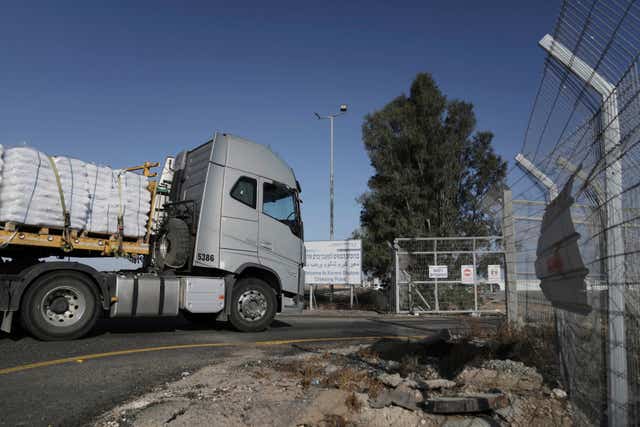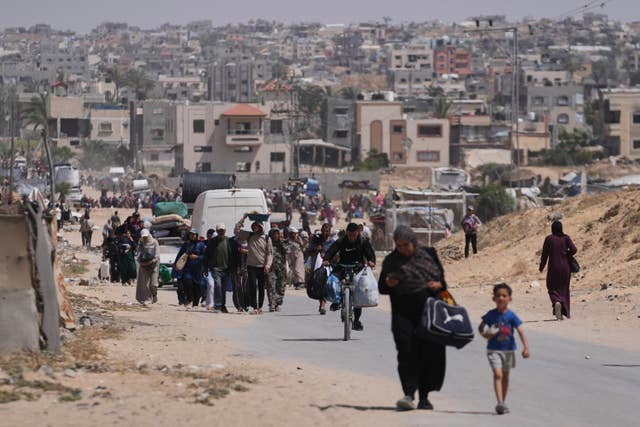Israeli strikes across Gaza kill at least 60 people, health officials say
On Monday, Israeli Prime Minister Benjamin Netanyahu began allowing a small number of aid trucks into Gaza for the first time in more than two months.

Israeli strikes pounded Gaza overnight and into Tuesday, hitting a family home and a school-turned-shelter, and killing at least 60 people, Palestinian health officials said.
The strikes came as Israel pressed its war against Hamas despite mounting international condemnation.
Israel launched another major offensive in the territory in recent days, saying it aims to return dozens of hostages held by Hamas and destroy the militant group.
More than 300 have been killed since the start of the latest onslaught. Israel says it aims to seize Gaza and hold on to territory there, displace hundreds of thousands of people and secure aid distribution.

As the new offensive ramps up, Israel agreed to allow a limited amount of aid into the war-ravaged territory after a blockade of more than two months that prevented the entry of food, medicine and fuel, among other goods. The blockade prompted warnings from food experts of a risk of famine.
Israeli Prime Minister Benjamin Netanyahu said he made the decision to let in minimal aid after pressure from allies, who he said could not support Israel so long as “images of hunger” were coming out of Gaza.
Criticism of Israel’s conduct intensified on Monday when allies Canada, France and the UK threatened “concrete actions” against the country, including sanctions, and called on Israel to stop its “egregious” new military actions in Gaza.
Mr Netanyahu rejected the criticism, saying it was “a huge prize” for Hamas’s attack on October 7 2023 that would invite more such violence.
So far, just a handful of trucks have been sent into Gaza, which UN agencies say is nowhere near enough to meet the massive need. Some 600 trucks a day had entered during a ceasefire earlier this year.
Criticism against Israel’s conduct in Gaza came also from inside the country, with a leader of Israel’s centre-left politics saying on Tuesday that Israel was becoming an “outcast among nations” because of the government’s approach to the war.
“A sane country doesn’t engage in fighting against civilians, doesn’t kill babies as a hobby and doesn’t set for itself the goals of expelling a population,” Yair Golan, a retired general and leader of the opposition Democrats party, told Reshet Bet radio.
His comments were a rare criticism from within Israel of its wartime conduct in Gaza.

Many Israelis have criticised Mr Netanyahu throughout the war, but that has been mostly limited to what opponents argue are his political motives to continue the war. Criticism like Mr Golan’s, over the war’s toll on Palestinian civilians, has been almost unheard.
Mr Netanyahu swiftly criticised Mr Golan’s remarks, calling them “wild incitement” against Israeli soldiers.
Over recent days, strikes have pounded areas across Gaza and Israel has issued evacuation orders for Gaza’s second-largest city, Khan Younis, which endured a previous offensive that left vast destruction.
In the latest strikes, two in northern Gaza hit a family home and a school-turned-shelter, killing at least 22 people, more than half of them women and children, according to the Gaza Health Ministry.
A strike in the central city of Deir al-Balah killed 13 people, and another in the nearby built-up Nuseirat refugee camp killed 15, according to the Al-Aqsa Martyrs Hospital.
Two strikes in the southern city of Khan Younis killed 10 people, according to Nasser Hospital.
There was no immediate comment from the Israeli military, which says it only targets militants and blames Hamas for civilian deaths because the group operates in densely populated areas.
The war in Gaza began when Hamas-led militants attacked southern Israel, killing some 1,200 people, mostly civilians, and abducting 251 others. The militants are still holding 58 captives, around a third believed to be alive, after most of the rest were returned in ceasefire agreements or other deals.
Israel’s retaliatory offensive, which has destroyed large swathes of Gaza, has killed more than 53,000 Palestinians, mostly women and children, according to Gaza’s Health Ministry, which does not differentiate between civilians and combatants in its count.





